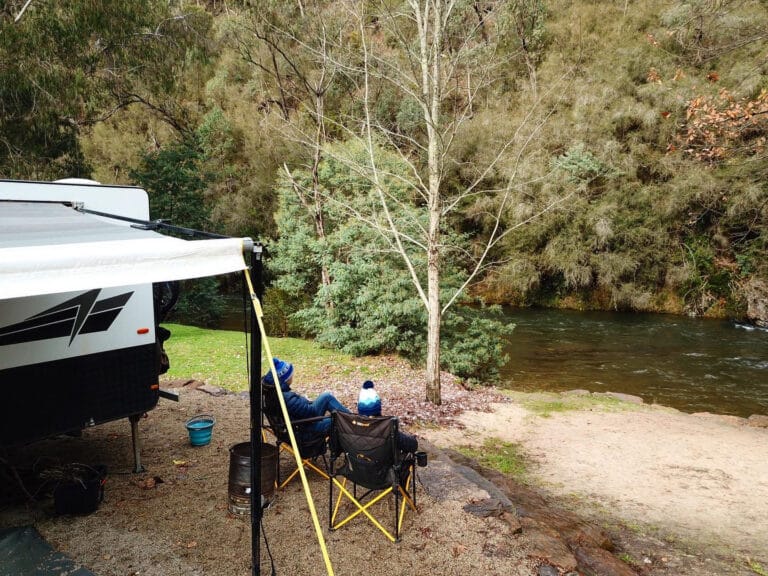The issue of overweight caravans is raising its head in official circles
Words & images Marty Ledwich
On January 4 and 5, 2017, a police officer from Orbost, Victoria, fired a figurative warning shot across the bow of the RV and boating communities. With the help of a small team from Vic Roads, Victoria Police and a group of media and industry representatives, Acting Sergeant Graeme Shenton ran a standard roadside police stop during Operation Roadwise – a Victorian State-wide blitz over the Christmas holiday period.
What made this unique was that he added the capacity to weigh caravans and other trailers by utilising Vic Roads personnel and portable roadside scales. Up until this day, this sort of operation (where RVs were subjected to weight safety checks) was considered a myth. Graeme’s salvo may have crossed the bows of the general towing communities, but it scored a direct hit on the myth – making the possibility of being subjected to weight safety checks a reality for all RV owners.
Graeme is a typical country cop. He is extremely friendly but you also get a sense that if the situation called for it, he would be a force to be reckoned with. Graeme has another side to his life. He is a fellow caravanner and he, like many of us, is passionate about the caravanning lifestyle. He is very knowledgeable about the subject, having gained a lot of experience from his own travels as well as from his police duties.
Orbost sits right at the critical point between the major summer holiday destinations of Lakes Entrance in Victoria and the southern New South Wales coast along the busy Princes Highway. Motor vehicle crashes involving caravans and boats are, unfortunately, a normal part of life in this area. This puts Graeme right in the middle of the debate. He has a unique perspective where he can actually see the situation from both sides. It was this insight that gave Graeme the wisdom to run the operation – not as an enforcement exercise, but more as an education initiative with the aim to raise the general awareness of towing safety.
I was present at the Newmerella operation and watched how the weight checks were conducted and how Graeme and his team interacted with drivers during the checks. They were patient, methodical, friendly, and willing to discuss the issues in a helpful and constructive manner. Others present included representatives from the Australian Caravanning Club who were on hand to talk to drivers and assist with the overall goal of education.
Drivers were given advice on how to reduce weight and the effects of weight distribution on stability. All drivers were given printed information detailing a step-by-step process to assist them to establish their empty and loaded weights and understand how to use a weighbridge. A TAC handout was also given to drivers, describing the effects of fatigue.
I spoke to many of the drivers that were tested and they were all pleased with the approach and valued the advice given to them.
Here is a snapshot of the results:
- 71 caravans were weighed across two days.
- Two drivers knew all their ratings.
- Most had an idea of what their maximum allowable weight was (ATM) but were confused about how to manage weights.
- Three knew what they actually weighed.
- 41 were overweight in one or more ratings (ATM, GTM, ball weight).
- Five were overweight by more than 20 percent.
In many respects these figures were entirely expected but when you see them written down like that, it is very confronting. Recognising that the sample from the weekend is not huge, if we were to apply a simple extrapolation of those figures to the wider RV community of over 600,000 registered vehicles across Australia, only 25,000 will actually know what they weigh. More troubling, out of the remaining 575,000 drivers who have little to no idea about what they weigh, nearly 350,000 are likely overweight in at least one category and around 42,000 are, in all likelihood, overweight by more than 20 percent.
The outcomes from this operation are many but some stand out, in particular in relation to the overall desire of caravanners to become more knowledgeable about the safety aspects of their activities. In this respect, it is now up to the authorities, the media and industry associations to start to develop and publicise this information on a broader scale. That said, everyone involved in the RV lifestyle has now been put on notice that the authorities are aware of the weight situation and are prepared to do something about it.
Newmerella is an enormous step forward in the path to safer RV motoring and it will likely have already saved lives. For this to be truly successful requires others in the industry (including those who are active on social media) to carry the momentum forward… but they must work together in order to achieve this common goal.
As for the rest of us, the average motorist who just happens to tow a caravan, a camper or a large boat, we need to step up and take some responsibility for our own actions. We will not be able to plead ignorance for ever.
The compliance plate on our RVs is a legal document and it should be treated as one. All of us need to take our rigs down to a weighbridge and get our weights checked.












